Highlights
- Overall, women preferred having more responsibility for child care tasks than men did. Post This
- Men enjoyed household tasks that involve physical work with objects, including outdoor labor and home fixes and maintenance, far more than women did. Post This
- Our findings reveal that men and women do not hold identical attitudes about the various tasks involved in managing a home and raising children. Post This
Despite women’s strong representation in the U.S. workforce, and despite positive attitudes throughout the populace toward working mothers and dual-earner households, women continue to spend less time at their formal jobs and more time cleaning the house and caring for children than men do. These disparities are often lamented and interpreted as manifestations of entrenched, traditional gender roles. As feminist writer Jill Filipovic has eloquently noted, when it comes to women’s roles and family set-ups, we are still “stubbornly stuck in old paradigms.” But recent data out of my lab, published in Evolutionary Behavioral Sciences, support the hypothesis that disparities in how men and women engage in home and child care may also be manifestations of average differences in how men and women prefer to spend their time.
In our study, we surveyed two groups of men and women from the Midwestern U.S.: (1) college-going emerging adults between the ages of 18 and 23, none of whom yet had children, and (2) middle-aged adults between the ages of 31 and 46, most of whom were partnered and currently raising one or more young children. We asked emerging-aged adult participants to rate how much they foresaw enjoying 40 specific childcare tasks and 58 specific household tasks. Our middle-aged participants rated their current attitude toward each task. Both samples reported how they would ideally split the responsibility for each task with their partner.
The findings are displayed in the figures below.1 Figure 1 shows that, in the aggregate, women enjoyed child care tasks more than men did. In fact, although both sexes provided favorable ratings to most tasks, there was not a single child care task that men liked (or foresaw liking) more than women did.
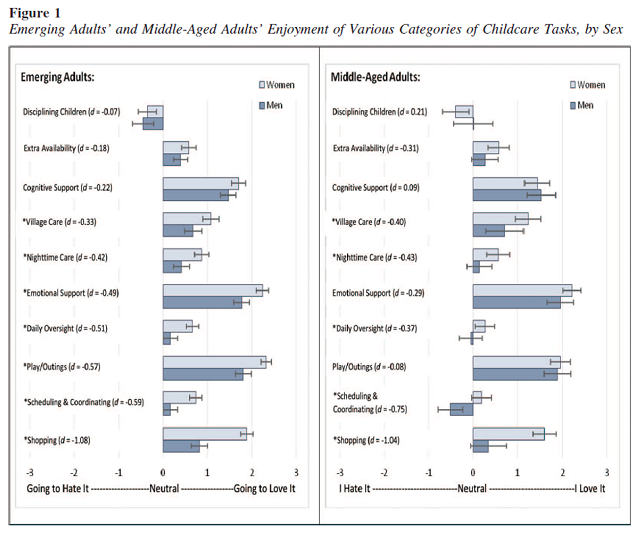
Figure 2 shows that, overall, women preferred having more responsibility for child care tasks than men did. Differences in task-split preferences were pronounced in the middle-aged adult sample, where for seven of 10 childcare categories, women leaned toward preferring more responsibility for themselves and men leaned toward preferring more responsibility for their partner. In the child care domains of (1) scheduling and coordinating children’s events and appointments and (2) shopping for children’s needs and wants, women in both samples preferred more responsibility and men preferred that their partner have more responsibility.
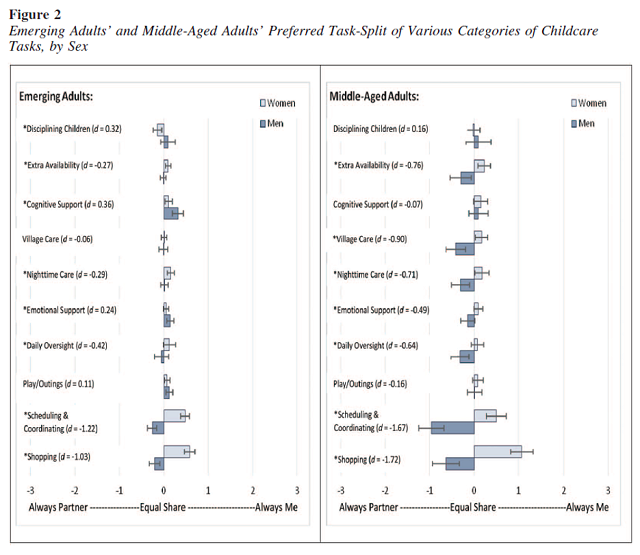
Figures 3 and 4 illustrate that men enjoyed household tasks that involve physical work with objects, including outdoor labor and home fixes and maintenance, far more than women did. In fact, women tended to dislike tasks involving outdoor labor and home fixes and maintenance. While women wanted their partners to have responsibility for those tasks, men themselves also preferred to have more responsibility for those tasks.
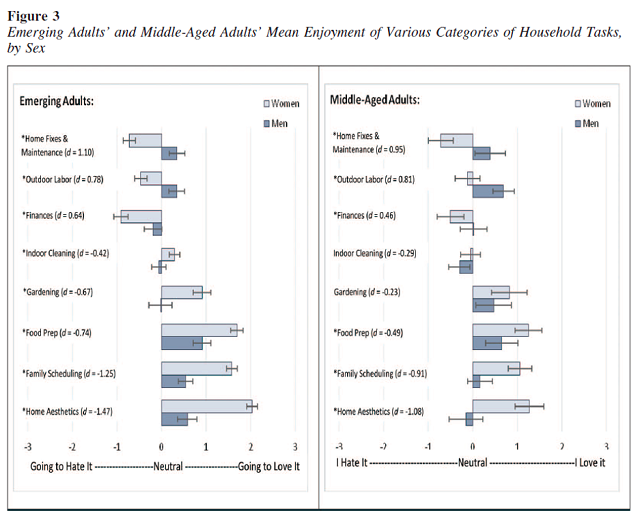
Meanwhile, women enjoyed tasks associated with food preparation, family scheduling and organizing, and home aesthetics much more than men did, and even though men did not necessarily dislike those tasks, men tended to prefer that their partner have more responsibility for those tasks and women themselves preferred to have more responsibility for those tasks.
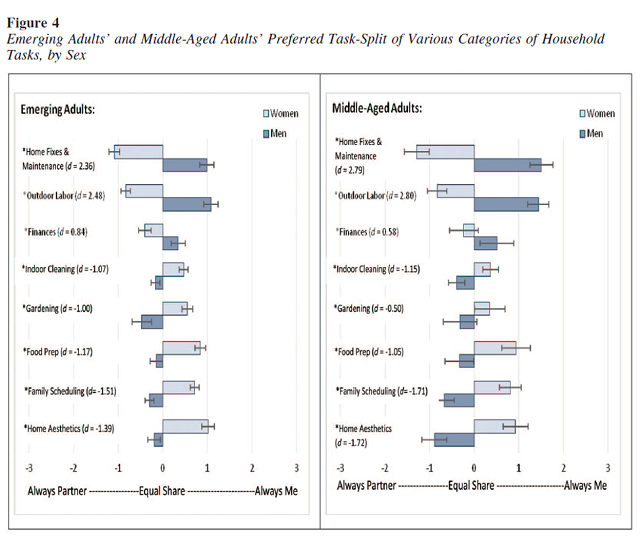
For some tasks, the sex difference was quite pronounced. For example, as shown in Table 1 below, the majority of women wanted their partner to have more responsibility for tasks such as vehicle maintenance and minor household repairs, and the majority of men wanted more responsibility for those tasks. Indeed, 1 in 4 men, but zero women, stated a preference for full responsibility for tasks like home repairs, plumbing, and vehicle maintenance. On the flip side, about 1 in 4 women preferred to assume full responsibility for the baking and home decorating.
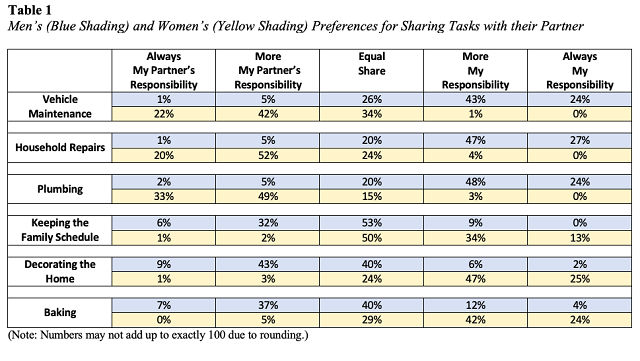
In a final set of questions, we asked participants to imagine a household with absolutely no constraints, and then we asked, “If you had your choice, how would you like to share work and household responsibilities with your partner/spouse?” Second, we asked participants to imagine a household with realistic constraints, where they and their partner have to compromise; we then asked, “What distribution of work and household responsibilities would you be willing to live with?”
As displayed in Figure 5 below, the pattern was consistent across the two samples: Men leaned toward the breadwinner role and women leaned toward the homemaker role. Although the completely egalitarian option in the middle was chosen by about half of the men and half of the women, a third of the men chose an option to the left of egalitarian (toward breadwinner), and a third of the women chose an option to the right of egalitarian (toward homemaker). When participants reported what they would be “willing to live with” when facing constraints and the need to compromise, the sex difference continued to be moderate to large in magnitude. Notably, the gender-differentiated task-split preferences, as shown above in Table 1, showed up even among those men and women who selected “We would share all responsibilities equally” as their preferred household role.
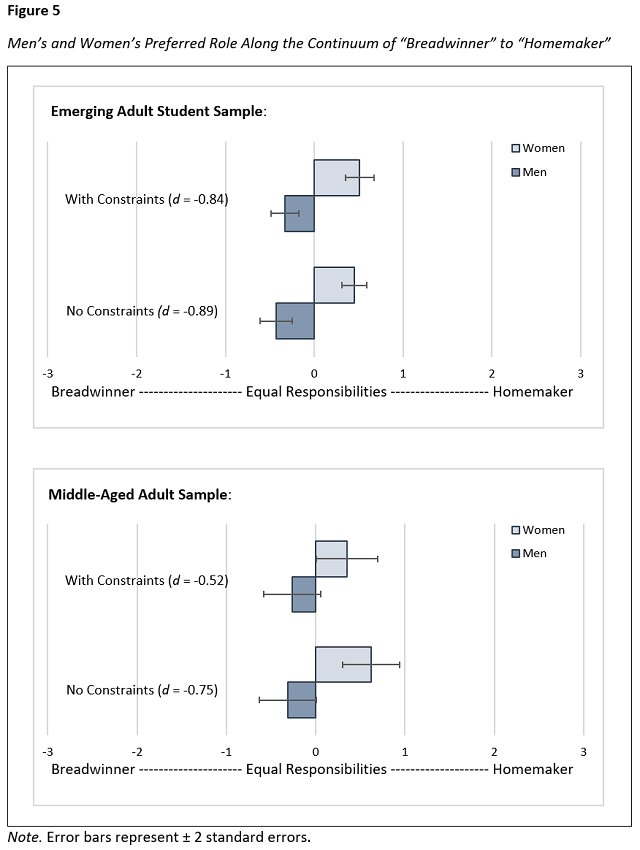
This research is important because it addresses a gap in the scholarly discussion regarding sex differences in housework and childcare: men’s and women’s attitudes. Moreover, we assessed those attitudes with a more detailed list of tasks than has been used in the past (see Appendixes below). Popular press blurbs sometimes describe women as “shoulder(ing)” the majority of the caregiving and household duties and then list just a few popular activities (such as laundry, cleaning, cooking, and yardwork). Moreover, use of the word “shoulder(ing)” implies that women necessarily view these tasks as a burden. Such descriptions do not convey the nuance of the variation in specific types of child care and household tasks, nor the possibility that some men and women alike might truly enjoy or take pride in some of them.
In conclusion, our findings reveal that men and women do not hold identical attitudes about the various tasks involved in managing a home and raising children. That said, there are many exceptions to any trend, and when we conducted within-person correlational analyses, we found that regardless of their sex, individuals tended to want moreresponsibility for the child care and household tasks they enjoyed and, unsurprisingly, less responsibility for those they did not enjoy. In the modern world, where men and women alike should be able to choose freely, perhaps the best thing partners can do is engage in candid conversations about their likes and dislikes—and recognize that striving for equity by sharing every single task equally is unlikely to make either of them happy in the end.
April Bleske-Rechek is a psychology professor at the University of Wisconsin-Eau Claire, where she directs the Individual Differences and Evolutionary Psychology Lab.
1. In all figures, each d (Cohen’s d) value represents the magnitude of the mean difference in standardized units.
Appendix A: The Household Tasks
Home Fixes and Maintenance (Enjoyment Rating α=.82; Task-Split Rating α=.91)
- Handling plumbing issues
- Handling minor electric problems (e.g., lightbulb, blown fuses)
- Handling minor repairs (e.g., broken screen door, rusty hinge, loose stair)
- Being at home to supervise maintenance repairs
- Home safety (e.g., alarms)
Outdoor Labor (Enjoyment Rating α=.87; Task-Split Rating α=.93)
- Taking care of the lawn (e.g., mowing grass)
- Taking care of the yard (e.g., trimming hedges)
- Landscaping
- Taking out the trash/recycling
- Cleaning the garage
- Cleaning out the gutters
- Washing the family vehicles
- Vehicle maintenance (e.g., gas, oil changes)
- Shoveling the driveway/sidewalk
Finances (Enjoyment Rating α=.83; Task-Split Rating α=.83)
- Balancing the checkbook
- Keeping a budget
- Handling the bills
- Doing the taxes
- Setting up the phone/cable plan
- Selecting home/auto insurance
Indoor Cleaning (Enjoyment Rating α=.88; Task-Split Rating α=.88)
- Dusting
- Mopping
- Sweeping
- Washing windows
- Washing dishes
- Cleaning spills and messes
- Cleaning out the refrigerator
- Vacuuming
- Cleaning counters
- Doing laundry (e.g., washing and folding clothes)
- Ironing
- Preparing the house for guests
- Putting things in their place (e.g., take dishes to kitchen)
- Changing sheets
- Making beds
Gardening (Enjoyment Rating α=.82; Task-Split Rating α=.77)
- Watering plants
- Gardening
Food Prep (Enjoyment Rating α=.80; Task-Split Rating α=.81)
- Making grocery lists
- Grocery shopping
- Cooking meals
- Baking
Family Scheduling and Organizing (Enjoyment Rating α=.84; Task-Split Rating α=.88)
- Sorting through old clothes and items for donation
- Keeping track of family members’ whereabouts
- Organizing clothes for next season
- Planning family activities/vacations
- Arranging couple social events
- Keeping track of birthdays
- Keeping the family schedule/calendar
- Buying gifts for friends and family
Home Aesthetics (Enjoyment Rating α=.84; Task-Split Rating α=.79)
- Decorating the home
- Shopping for household items
- Rearranging furniture
(Miscellaneous)
- Selecting family vehicles
- Retrieving/handling the mail
- Putting up holiday lights
- Painting/staining
- Repairing clothes
- Feeding pets and pet care
Appendix B: The Child Care Tasks
Discipline
- Disciplining children
Extra Availability (Enjoyment Rating α=.76; Task-Split Rating α=.73)
- Dealing with issues at the school/nursery
- Taking children to appointments
- Taking time off work to take care of a sick child
- Attending parent-teacher conferences
- Giving up personal time to care for children
Cognitive Support (Enjoyment Rating α=.64; Task-Split Rating α=.67)
- Teaching/educating children
- Helping/supervising homework
Village Care (Enjoyment Rating α=.62; Task-Split Rating α=.58)
- Conversing about children with extended family
- Problem-solving with friends and family about child rearing issues
Nighttime Care (Enjoyment Rating α=.72; Task-Split Rating α=.62)
- Nighttime feedings
- Going through a bedtime routine
- Reading bedtime stories
- Getting up at night to care for children
Emotional Support (Enjoyment Rating α=.86; Task-Split Rating α=.77)
- Watching children at their activities
- Talking with children about their day
- Talking with children about their concerns/fears/goals
- Comforting children when in need
Daily Oversight (Enjoyment Rating α=.84; Task-Split Rating α=.78)
- Feeding children
- Packing school bags
- Overseeing children’s chores
- Overseeing children’s hygiene (e.g., bathing, brushing teeth)
- Getting children up in the morning
- Changing diapers
- Potty-training children
- Driving children to and from activities
Play/Outings with Children (Enjoyment Rating α=.84; Task-Split Rating α=.73)
- Bringing children to the park
- Taking children on special outings
- Playing with children
- Spending time with children
- Napping with children
Scheduling and Coordinating (Enjoyment Rating α=.79; Task-Split Rating α=.86)
- Arranging childcare
- Arranging play dates for children
- Organizing birthday parties
- Finding a babysitter
- Scheduling children’s appointments (e.g., doctor, dentist, haircuts)
- Managing division of labor of parenting tasks
Shopping for Children’s Needs and Gifts (Enjoyment Rating α=.75; Task-Split Rating α=.78)
- Buying school supplies
- Buying clothes for children
- Buying gifts for children














